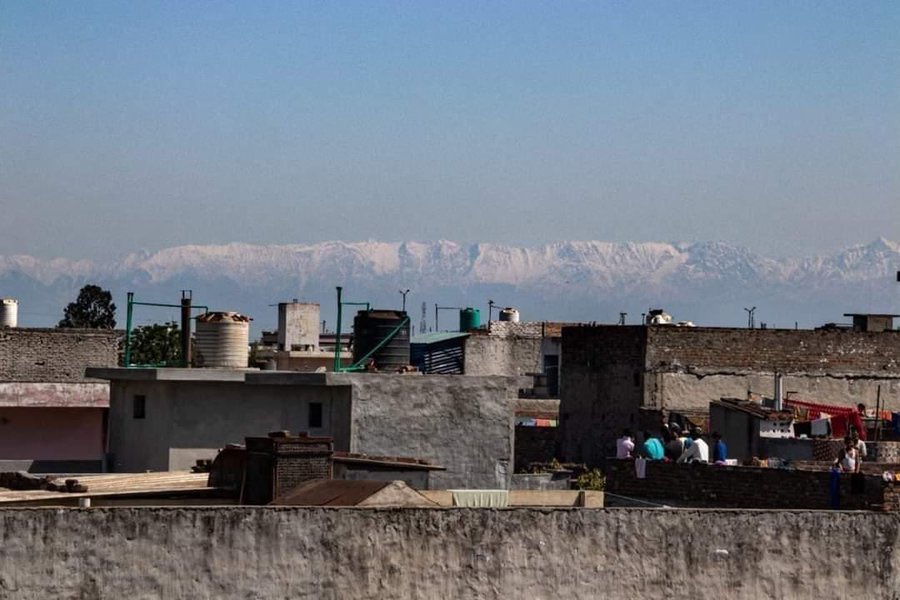Nothing is permanent, so everything is precious. Here’s a selection of some happenings—fleeting or otherwise—in the Buddhist world this week.
Himalayas Visible as Pollution Levels in India Drop
Some residents of northern India are enjoying one positive consequence of the otherwise devastating coronavirus (COVID-19): the Himalayas are visible from their homes for the first time in 30 years. Many Indian cities have an air quality index (AQI) that is considered “unhealthy” (101 or higher on the 500-point index) or “very unhealthy” (201 or higher). But between March 16-27, as cities went into lockdown and industrial activities came to a halt, the India Today Data Intelligence Unit reported an average improvement of 33 percent on the AQI. The industrial city of Bhiwadi in the northern state of Rajasthan had a dangerous AQI of 221 at this time last year, which fell to 42 this year—an 81 percent improvement. As a result of the drop in particles in the air, the snow-capped mountains can now be seen from as far as 200 kilometers away.
“I have never seen anything like this in recent times,” Sant Balbir Singh Seechewal, an environmental activist living in the Jalandhar district of Punjab, told SBS Hindi. He also noted that stars are now visible at night. Seechewal hopes the noticeable decrease in pollution will be a wake-up call. “The unimaginable has happened,” he said. “It shows nothing is impossible. We must work together to keep it like that.”
Buddhist Temple in Arkansas Vandalized
Wat Lao Santitham, a Buddhist temple in Fort Smith, Arkansas, was vandalized last Sunday. According to local news station News22, police arrived on the scene to find a 21-year-old man holding a hammer and smashing multiple Buddha statues. A police bodycam video shows the man being arrested, stating that he had to destroy the “false idol[s].” Many temple congregants were afraid to return to their place of worship. “This incident has left many of the elderly members of the temple feeling hurt, speechless, and uneasy,” temple member Thy Sorluangsana wrote in a GoFundMe campaign, which he created to raise money to repair the statues. “[T]he peaceful temple that they’ve visited every week in what had been a quiet area for decades has lost its tranquility.” The damage to Wat Lao is estimated at around $10,000. Buddhistdoor reports that as the coronavirus pandemic spreads in North America, so have racist attacks against Asians, Asian-Americans, and their places of worship. Last month, potential hate crimes also occurred at temples in Montreal, Canada.
Residents and Medical Workers in China Question Death Toll
Now that the coronavirus in Wuhan, China, appears to be contained, many familiar with the area where the outbreak began are voicing doubts about the official death toll. As of Friday, April 3, China reported a death toll of 3,322, but medical workers and others in the county say the number should be higher, according to the New York Times. The police in Wuhan have been shutting down groups set up by relatives of coronavirus victims on the messaging app WeChat in an effort to quell these doubts, while government censors have been removing images of families at funeral homes from social media. Liu Pei’en, whose father died of coronavirus, told the Times that government officials followed him to the funeral home and later monitored the burial ceremony.“My father devoted his whole life to serving the country and the party only to be surveilled after his death,” he said. Zhang Hai, a native of Wuhan whose father also died of coronavirus, said it took officials weeks to inform the public about the spread of the virus and that he “will never be at peace” until he receives an explanation for the government’s attempt to conceal the outbreak.
Coronavirus Derails Citizenship Oath for Immigrants in US
Naturalization ceremonies across the country have been canceled due to COVID-19, and US Citizenship and Immigration Services, the agency that administers immigration benefits, has been closed to the public since March 18. While officials say that the citizenship ceremonies will be rescheduled, the timing remains uncertain, making many immigrants nervous, Buzzfeed reports. Soto Zen Buddhist priest and professor at the University of Southern California Duncan Ryuken Williams told Buzzfeed that he intended to get his US passport in the first half of this year and vote in the upcoming elections—but that opportunity has been put on hold. “What is more unsettling is the uncertainty about the future implicated in the inability to complete the naturalization process,” he said. The current administration’s restrictive immigration policies—and rise in anti-Asian rhetoric due to COVID-19—had also created a sense of urgency for Williams to obtain US citizenship. “As a Japanese national, I’ve been observing the rising anti-Asian sentiment in the US with some trepidation, with some regret that the protections afforded to citizens is not something I can secure at the present time.”
***
We conclude this week’s Buddha Buzz with a poem, written recently by Buddhist teacher Joseph Goldstein.
Pandemic
Sheltered and safe
when others are not,
fed and nourished
when others are not.
How to live
in such a world
alone and connected
at the same time?
Facing forward
stepping back,
do we turn away
or look beyond ourselves
as we choreograph this dance
of fear and love?
Thank you for subscribing to Tricycle! As a nonprofit, we depend on readers like you to keep Buddhist teachings and practices widely available.
